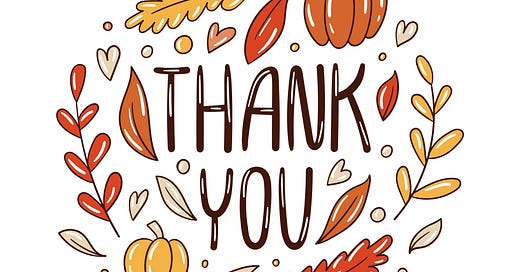Hi everyone,
Greetings from Chicago! We’re here visiting my sister (I haven’t seen her in two years!!!) and her family. We’re having a big week celebrating my birthday, her birthday — it’s a big one — and Thanksgiving, and my parents and aunt are joining us too. I’m so grateful that after such a long and hard few years, we’re able to see each other, hug each other and celebrate together.
Because there’s so much going on, I don’t have a “proper” newsletter for you this week, but I do want to say a few words about how thankful I am feeling right now. It’s been a whirlwind year which has included the birth of this newsletter as well my book, and I’ve been overwhelmed by your support and encouragement throughout. To know that so many people want my science-based parenting advice — it makes all the hard work worthwhile.
I am especially thankful to those of you who’ve supported me with paid subscriptions, because, again, this work isn’t easy. I believe that good parenting journalism is just as important as other kinds of journalism and that it deserves to be recognized and supported, and it feels really good to know that so many of you agree. (If you want to subscribe now — I mean, yesterday was my birthday, after all! — please, please do.)
As Thanksgiving approaches, I also want to say: Hang in there. As I’ve written here before, holidays can bring out the worst in kids. Change, transition, travel and anticipation can make children anxious and challenging, so do your best to be patient with them and with yourself this week. I find that the weeks we look forward to the most are often, as parents, the hardest.
If you feel like your kids are acting like ungrateful jerks (one of mine just walked over to me and DEMANDED hot chocolate), here’s an excerpt from a story I wrote for Slate a few years ago over Thanksgiving week:
To some degree, every kid is ungrateful, at least toward her parents, and that’s natural. “Often, parents are the least appreciated in a child’s world,” says Ross Thompson, a developmental psychologist at the University of California at Davis. That’s a somewhat perplexing fact, but in many ways, Thompson says, it makes sense. Gratitude is based on expectations: You’re more likely to feel grateful toward a store employee who goes out of his way to show you where to find the gravy than you are for the checkout clerk who rings you up, just doing his job. Likewise, “children and adults in our society both live with the expectation that adults should and will take care of children, and that children, especially when they are young, can confidently expect that care,” Thompson says. In other words, your kid isn’t going to be supremely grateful for the 4,392 times you have sung “The Wheels on the Bus,” picked her up from soccer practice, and made her peanut butter and jelly sandwiches, because that’s just what parents in our culture do. Get over yourself.
And sometimes, bratty behavior is simply a sign of normal development. That’s particularly true of toddlers and young preschoolers, who can’t regulate their emotions as well as older kids do. “When they get their mind fixed on getting a particular toy, or indulging in a treat just before dinner, their lack of cognitive flexibility can make it hard for them to think they can ever possibly be happy if they don’t get it,” Thompson says. “It’s easy for a parent to see that [child] as overindulged, maybe even entitled, but it’s really reflecting a self-regulation problem.” (For more on the fun behaviors caused by a lack of self-regulation, see my temper tantrums column.) All this isn’t to suggest that you shouldn’t try to instill gratitude in toddlers or that you should always give preschoolers what they want; it just means that tantrums and selfish demands aren’t a sign that your young child is turning into a holy terror.
Enjoy your week (to the degree that you can), eat all that you want without feeling guilty, and I’ll be back with more next week!
Other news: I’m this week’s guest on the Meaning Full Living podcast with Hayley Hubbard and Jessica Diamond! Listen here!






